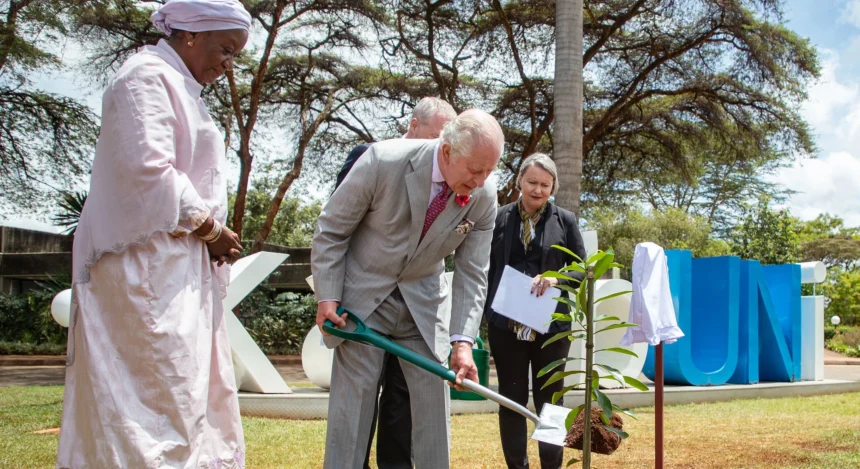The world today is facing unprecedented challenges due to climate change and environmental degradation. Among the many champions of environmental sustainability, King Charles III has been a vocal and passionate advocate for decades. His commitment to promoting green practices extends to various sectors, including travel. In his quest for a more sustainable future, King Charles sustainable travel initiatives are making headlines globally, showcasing how travel and tourism can coexist with the environment.
This article takes a deep dive into King Charles sustainable travel initiatives and explores 10 key facts about it. With a long-standing history of environmental activism, the British monarch continues to lead by example, driving change in the global conversation around sustainable tourism and responsible travel practices.
Fact 1: A Life-Long Advocate for Environmentalism
Before delving into his travel initiatives, it’s essential to understand King Charles’ environmental journey. His advocacy for sustainability isn’t a new interest. As early as the 1970s, Charles began speaking about the need to protect the environment, long before it became a widespread global concern. His speeches often emphasized the interconnectedness of nature and humanity and called for action on issues like deforestation, pollution, and climate change.
King Charles’ passion for the environment is now shaping how the royal family approaches travel and tourism, leading to a major shift in how they manage royal engagements and their carbon footprint.
Fact 2: Reducing the Royal Carbon Footprint
Travel is essential for the royal family’s duties. Whether attending state events or promoting charitable causes, the British royal family often crisscrosses the globe. However, King Charles III has prioritized minimizing the carbon footprint of his travels.
To achieve this, the King has implemented various measures such as:
Reducing the number of international trips and promoting local engagements
Choosing eco-friendly modes of transport where possible
Offsetting carbon emissions from royal air travel through investment in green energy projects.
By setting these practices in motion, King Charles is demonstrating how even high-profile individuals can balance the demands of travel with sustainability.
Fact 3: Supporting Sustainable Aviation
One of the most significant sources of greenhouse gas emissions comes from air travel. King Charles has been a staunch advocate for greener aviation technology, supporting the development of sustainable fuels and innovative aircraft designs that produce fewer emissions.
In a 2019 interview, King Charles stated, “It is vital that we rethink how we travel and adopt new technologies that reduce our environmental impact.” He believes sustainable aviation holds the key to decarbonizing long-haul flights, which is essential for a more sustainable future in travel.
In collaboration with the Sustainable Aviation Coalition, Charles has advocated for research into cleaner jet fuels, and he’s encouraged governments and corporations to invest in renewable energy technologies that could revolutionize the aviation industry.
A detailed table presentation is here for “King Charles Sustainable Travel Initiatives”.
| Initiative | Description | Environmental Impact |
|---|---|---|
| Promotion of Eco-friendly Tourism | Encouraging travelers to visit destinations that focus on sustainability, like eco-lodges and renewable energy-powered communities. | Supports low-impact tourism and conserves natural ecosystems. |
| Advocacy for Renewable Energy | Supporting renewable energy sources in tourism and infrastructure projects, such as electric transportation and green hotels. | Reduces reliance on fossil fuels, lowering carbon footprints in tourism. |
| Sustainable Transportation Choices | Advocating for public transportation, cycling, and electric vehicles during travel. King Charles has been seen promoting these options globally. | Decreases greenhouse gas emissions, especially in urban areas. |
| Campaign Against Plastic Pollution | Actively promoting a reduction in single-use plastics and encouraging eco-friendly alternatives, especially in tourism-heavy areas. | Reduces marine and land-based plastic pollution, protecting wildlife. |
| Support for Conservation Travel | Working with organizations to protect endangered species and promote responsible wildlife tourism. Travelers are encouraged to contribute to conservation efforts. | Protects biodiversity and raises awareness about the importance of wildlife preservation. |
| Encouraging Green Building Practices | Through his Prince’s Foundation, King Charles promotes green architecture, especially in hotels and tourist accommodations. | Helps reduce the environmental impact of construction in popular travel destinations. |
| Local Economic Support via Travel | Promoting tourism that benefits local communities, advocating for tourists to buy local, stay in locally-run accommodations, and support local artisans. | Boosts local economies while reducing the environmental impact of global supply chains. |
| Sustainable Fashion Choices During Travel | Endorsing and wearing sustainable fashion brands during official travel engagements, inspiring eco-conscious travel attire choices. | Reduces environmental harm caused by fast fashion in the tourism industry. |
| Heritage Conservation Tourism | Supporting tourism to historical sites with a focus on sustainable maintenance and preservation. King Charles encourages green heritage projects. | Ensures that historical and cultural sites are preserved for future generations with minimal environmental impact. |
| Food Sustainability and Waste Reduction | Initiatives that promote sustainable sourcing of food, especially at tourism locations, and reducing food waste at hotels and restaurants. | Reduces food waste, lowers carbon emissions from food production, and supports local agriculture. |
Fact 4: Promoting Eco-Friendly Tourism Destinations
One of the significant King Charles sustainable travel initiatives involves promoting eco-friendly tourist destinations. Through his various foundations, King Charles has endorsed and supported several conservation projects around the world, particularly in the Commonwealth nations.
Some of the key projects for King Charles sustainable travel initiatives include:
Supporting marine reserves in the Pacific
Encouraging eco-tourism projects in Caribbean islands
Promoting sustainable agricultural tourism in Africa.
The aim of King Charles sustainable travel initiatives is that by investing in eco-tourism and sustainable travel infrastructure, local communities can benefit economically while protecting their natural resources.
Fact 5: The Use of Electric and Hybrid Vehicles
Royal engagements often require road travel, and King Charles has ensured that even these journeys are as sustainable as possible. A long-time advocate of electric and hybrid vehicles, the King was one of the first public figures to adopt greener transportation methods to support King Charles sustainable travel initiatives.
Charles owns several electric cars, and when traveling within the UK, the royal family increasingly uses electric vehicles. By transitioning to these eco-friendly alternatives, Charles is setting a precedent for reducing the emissions associated with road travel.
Fact 6: Sustainable Royal Residences
Another integral part of King Charles sustainable travel initiatives revolves around the sustainability of royal residences. Several royal properties, such as Highgrove House and Clarence House, have undergone eco-friendly transformations under Charles’ guidance.
For example:
Highgrove House now runs on renewable energy, using solar panels and biomass boilers.
Birkhall, the King’s residence in Scotland, features a sustainable water treatment system.
These residences not only reflect King Charles’ commitment to sustainability at home, but they also serve as models for eco-tourism. Visitors can experience the beauty of these residences while learning about green living practices.
Fact 7: The “Terracotta Army” Initiative
Named after the famous Chinese statues, King Charles’ “Terracotta Army” initiative refers to the work of his Prince’s Foundation to promote sustainable agriculture and tourism. The King Charles sustainable travel initiatives support communities that depend on agriculture and tourism for their livelihoods by teaching sustainable farming techniques and helping develop eco-tourism infrastructure.
From rural Scotland to the rainforests of Central America, the Terracotta Army initiative encourages visitors to engage in low-impact, environmentally friendly tourism that celebrates local culture and ecosystems.
Fact 8: Championing Sustainable Fashion in Travel
Sustainable fashion has become another focal point in King Charles sustainable travel initiatives, especially regarding travel. Fashion plays a significant role in tourism, particularly when it comes to high-profile royal tours. King Charles has encouraged the fashion industry to move towards sustainable practices, which involve using organic materials, reducing waste, and promoting fair trade practices.
On his tours, King Charles has been spotted wearing eco-conscious outfits made from sustainable fabrics. His involvement in initiatives like The Prince’s Foundation supports the development of sustainable fashion, providing an example of how fashion and travel can intersect in an eco-friendly way.
Fact 9: Nature Conservation and Wildlife Tourism
King Charles has consistently emphasized the importance of preserving natural habitats and biodiversity, particularly in the realm of wildlife tourism. His initiatives support the protection of endangered species and the development of responsible wildlife tourism in Africa and Asia.
Through partnerships with organizations like the World Wildlife Fund (WWF), King Charles promotes responsible tourism that ensures wildlife conservation while benefiting local communities economically. This approach is aimed at preventing exploitative tourism practices that harm ecosystems and wildlife.
Fact 10: Influencing Global Leaders on Sustainable Travel
Beyond his personal efforts, King Charles plays a pivotal role in influencing world leaders to adopt sustainable travel practices. He has used his platform at international forums like the UN Climate Change Conference (COP) to stress the importance of sustainability in tourism.
In these speeches, King Charles advocates for stricter environmental regulations in the travel and tourism industries, the promotion of greener technology, and the protection of vulnerable ecosystems. His influence has contributed to shaping policies that encourage sustainable tourism on a global scale.
FAQ Section: King Charles Sustainable Travel Initiatives
Q1: Why is King Charles so passionate about sustainable travel?
King Charles has a lifelong commitment to environmentalism, which began in the 1970s. His passion stems from his belief that humanity and nature are deeply interconnected and King Charles sustainable travel initiatives are essential for preserving the planet for future generations.
Q2: What are some of the key areas of King Charles sustainable travel initiatives?
King Charles focuses on reducing carbon emissions from travel, promoting eco-tourism, supporting sustainable aviation, and encouraging the use of green technologies like electric vehicles. He also works on wildlife conservation and promoting sustainable fashion during royal engagements.
Q3: How does King Charles offset the royal family’s carbon footprint from air travel?
The royal family offsets their carbon footprint by investing in green energy projects and sustainable initiatives. This includes investing in renewable energy, supporting research into sustainable jet fuels, and encouraging global leaders to adopt similar practices.
Q4: What is the “Terracotta Army” initiative?
The “Terracotta Army” initiative is a sustainable tourism and agricultural project under King Charles’ Prince’s Foundation. It supports communities by teaching sustainable farming practices and promoting eco-tourism that benefits both the environment and local economies.
Q5: Does King Charles use electric vehicles for royal engagements?
Yes, King Charles is a strong advocate for electric and hybrid vehicles and has made them a key part of King Charles sustainable travel initiatives. He owns several electric cars and frequently uses them for official engagements within the UK.
Q6: How is King Charles promoting sustainable tourism destinations?
King Charles supports eco-tourism projects, particularly in Commonwealth countries, by endorsing conservation efforts. King Charles sustainable travel initiatives aim to protect natural resources while providing economic benefits to local communities through sustainable travel.
Q7: How does King Charles influence global policies on sustainable travel?
As a respected global figure, King Charles uses his platform to speak at international events like COP and engage with world leaders. He advocates for the adoption of green policies in the travel industry and stresses the importance of protecting vulnerable ecosystems from the impact of tourism.
Q8: What role does fashion play in King Charles sustainable travel initiatives?
King Charles is an advocate for sustainable fashion, promoting eco-friendly clothing and responsible fashion practices during royal tours. King Charles sustainable travel initiatives highlight how even fashion can play a role in reducing the environmental impact of travel.
Q9: How do the royal residences reflect King Charles’ commitment to sustainability?
Many of the royal residences, including Highgrove House and Birkhall, have been transformed into eco-friendly properties under King Charles sustainable travel initiatives guidance. They use renewable energy sources, eco-friendly designs, and sustainable water treatment systems, serving as models for green tourism.
Q10: What is King Charles doing to promote wildlife conservation in tourism?
King Charles supports wildlife conservation initiatives, particularly in Africa and Asia, through partnerships with organizations like WWF. His efforts aim to protect endangered species and promote responsible wildlife tourism that ensures ecosystems and biodiversity are preserved.
Conclusion: King Charles Sustainable Travel Initiatives
King Charles sustainable travel initiatives are a testament to his dedication to environmental preservation. Through his advocacy, investments, and public engagements, he’s leading the charge in reshaping the travel industry toward a more sustainable future. By balancing the needs of global tourism with the importance of protecting the planet, King Charles continues to set a powerful example for individuals, organizations, and governments around the world.








